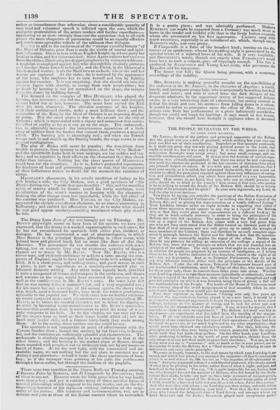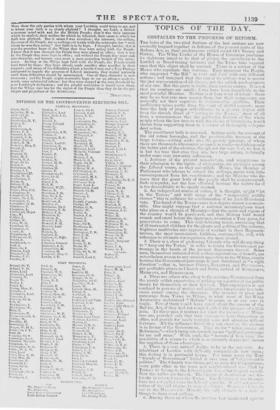TIIE PEOPLE BETRAYED BY THE WHIGS.
TO LORD JOHN RUSSELL.
3IY LORD—As one of the authors and principal supporters of the Reform Act. the people owe you a debt of gratitude, which nothing but your own con- duct can blot out of their recollection. Imperfect as that measure confessedly is, it made one great step towards placing political power in the hands that ought to wield it ; but it was only a step. It is true the greater part of the nomination Boroughs were swept away ; but many small, corrupt, and con. ruptible constituencies still exist. It is true that the doctrine of virtual repre- sentation was virtually extinguished ; but there can never be real iepresenta• tion until the electors are protected in the free exercise of that franchise which you yourself helped to create. It was with pain and grief, therefore, that I read your manly, as it is called, but infatuated declaration, that you would not consent to afford the protection required against those very influences of corrup- tion and intimidation which you admit have prevailed to a very lamentable extent. Haw comes it, my Lord, that you, who can so clearly perceive the evils, should be so blind to the remedy ? bow conies it that you, who profess to be so willing to amend the details of the Reform Bill, should be so utterly forgetful of its principle and its spirit ? In your own arguments, my Lord, we find the clue to your motives.
You begin by saying, you consider the questions of the Ballot, Extension of
the Suffrage, and 'Triennial Parliaments, 'as nothing else than a repeal of the Reform Act, and as placing the representation on a totally different footing." Your Lordship labours under no slight mistake in supposing that either of these three measures would operate iu any way as a repeal of the Reform Act, or that they would place the representation on a different food ; for they are in truth actually necessary in order to bring the principles of the Reform Act into full operation. The argument that the Ballot would ope- rate as a repeal of the Reform Act, comes with a very bad grace from one who not bug since stated that the Ballot formed an intrinsic part of the , first draft of that measure, and was only given up to satisfy the scruples of some members of the Cabinet ; there can therefore be no such complete oppo- silica in principle between the Ballot and the Reform Act that the introduc- tion of the one necessarily implies the repeal of the other. Neither can there be any pretence for calling an extension of the suffrage a repeal of the Reform Act, since the very principle on which that act was founded was an extension of the suffrage. The only question that ought to arise on this point is, whether the people are prepared, by an increase of intelligence, as I believe them to be, for a further extension of that franchise, which is the right of all who can use it properly. And as to 'Triennial Parliaments, they do not in any way whatever interfere either with the principles or the details of the Reform Act. Under the old system, Triennial Parliaments formed part of our numb-lauded Constitution, until the Whigs of that day, who were elected for three years only, chose to convert those three years into seven. Whether your Luraship chooses to take these measures individually or collectively, instead of being a repeal of the Reform Act, they will be found to strengthen and sup) port the principles on which it was founded, being those of giving a full and free representation of the People. The leader of the House of Commons must have a strong idea of the f,tnlid temperament of that assembly when he con- ceirtil such fallacies as these would pass for argument.
Your next argument is, that because having now only five years ago
reforti.ed the representation, having placed it on a new basis, it would be a ulo-t unwise and unsound experiment to begin the process again, to form a new suffrage, a change in the manner of voting, nail to look for other and new securities for the representation of the people. I say, at least for myself, that I can take no share in such an experiment." The Reform Act itself was but an experiment—au experiment that has failed from the timidity of the maniple lators. If all our scientific men had been of your Lordship's opinion—if on the failure of one experiment they had ceased their operations—if they had been too timid to persevere, or too much frightened to try other experiments—they would never have obtained any satisfactory results. But they, believing the principles on which they were acting to be correct, proceeded with the experi• rents until they had made them perfect. On the other hand, your Lordship, while professing to believe in the truth of your principles, shrinks from the only means that can test their truth or prove their excellence. You are, in fact, doing what you say is "nonsense ;" and, as much as lies in your power, are en- deavouring to make the Reform Act a "final measure," by refusing to cure its deficiencies and carry out its principles. We come at length, however, to the real reason by which your Lordship is act tuatesl, and which has inlisted you amongst the supporters of that Conservatism which is so well defined by My. (Snore: as "the negation of all substantial re, form." And your argument is that of a cold•blooded aristocrat, who thinks merely of what may be pleasing to his order, rather than of what is right, and just, and beneficial to the nation. You say, " It is quite impossible for me, having been one who brought forward the measure of Reform, who felt bound by the decla- rations then made, to take any part in these large measures of reconstruction, or to consent to the repeal of the Reform Act, without being guilty of what I think would Ili' a Inoraeo of faith towards those with whom 11001 then acting." Arid who were they with whom your Lordship was then acting, and with whom you are now SO le:uiiii of breaking your faith ? Were they the few aristocrats alone who farmed the Administration of Lord C mciv, and amongst whom any Lord SIASLEF and Sir JAMEi 6RALIA31 played such conspicuous parts? Were these the only parties with whom your Lordship could deign to act, and to whom your faith is so closely plighted ? I thought, my Lord, a British statesman acted with and for the British People; that it was their interests which he studied, their welfare for which he laboured, their cause to which his faith was plighted. But it seems I was mistaken ; the interests, the welfare, the cause of the People, are as nothing—it is only with the aristoratic few ,4 with whom he was then acting" that faith is to be kept. I thought, besides' that it was the proudest boast of the Whigs that they were acting with the People. I know that it was through the People they were placed in office ; that it was by the People they were kept in office ; and without the People they must sink into obscurity, and become once more a mere powerless branch of the aristo- cracy. As long as the Whigs kept faith with the People, the People would have stood by them : they have already made sacrifice after sacrifice in their support; and aware of the difficulties which a hostile Court and a Tory Peerage interposed to impede the progress of Liberal measures, they waited patiently until these difficulties should 'be surmounted. One of these obstacles is now overcome ; and the People might reasonably hope to see an advance made to- wards some substantial reform : but they were stopped at the very threshold by your Lordship's declaration ; and the painful conviction is forced upon them, that the Whigs care less for the rights of the People than they do for the pri- vileges and prejudices of the Aristocracy.
;Gw cocas.



























 Previous page
Previous page